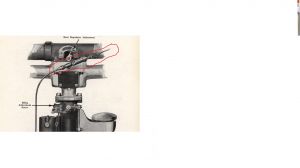- Home
- About Us
- Join/Renew
- Member Benefits
- Member Pages
- Log In
- Help
- Museum Store
I am looking for a 1926 Series 80 fuel primer pump.
Thanks

John Cislak had one for sale at Hershey, give him a call.
Arvydas,
Welcome to the PAS.
In searching these parts, you will need to be patient and persistent.
It may take years, and some machine shop work to fulfill your needs.
It is just that the parts are not as available as they were 10 to 15-years ago.
Good hunting and feel free to ask questions of the Series 80 / 81 group, as we are a large and knowledgeable bunch of Gents.
Again, welcome!
Peter
Is that in place of an acceleration pump?
Brian,
That Primer Valve is just for starting the car.
It is not a pump.
It works, when activated, by pulling gas from the carburetor fuel bowl and shooting it into the intake manifold using the vacuum created by the pistons moving up and down in the cylinder block.
It does nothing if the engine is not turning over.
It is activated by pulling on the “Primer”” knob while cranking over the engine.
Any accelerator pump ought to be a part of the carburetor itself and should be connected to the fuel pedal / carburetor connection.
Peter
“
I am still looking for a 1926 Series 80 fuel primer .
Thanks
If the absolute original can’t be located, I watch priming pumps at EBAY and it seems several different flavors of priming pumps are always available, (including one that claims to be a proper Pierce-Arrow item). Maybe one of those fuel primers could be made to work until the proper item could be procured.
Al
The purpose of this valve (not a pump) is to allow a little squirt of fuel from the pressurized fuel tank directly into the intake manifold. It takes pressurized fuel from below the carburetor fuel bowl. Engine does not need to be running, this is for starting purposes only. Very simple, clever, effective device.
Thanks, but I want to put original or make like original. If it will be “Dole” primer,- the Pierce Arrow not will be PA. I’m wrong?
Arvydas,
Above, Ed Minnie suggested that you telephone John Cislak as he might have the part you seek.
However, I believe that Ed did not understand that you live in Lithuania.
John Cislak is a PAS member and can be contacted via email at: [email protected].
Good luck,
Peter
Thanks, Peter, for your explanation. I did not know this device on my Series 80 is a valve, not a pump. Now I know how to use it effectively.
Arvydas, Wayne made some of these and had extras for sale, contact info below. Karl
Wayne & Nancy Hancock
6509 Travis Blvd
Tampa, FL 33610-5504
USA
Home Phone: 352/797-6008
Email to: [email protected]
To repeat and to add to the above information;
This is a valve. it was used from the ‘teens’ up through 1928.
The teen’s and Series 33/36 cars had a pressurized fuel tank and fuel delivery system. As stated above by Miles, if the fuel system is pressurized, whether the engine is running or not, if the primer’s shaft is pulled, fuel WILL squirt down the intake manifold and drip onto the throttle butterfly.
On the Series 80/81 cars, the fuel system used a Stewart Warner vacuum draw system with a reservoir on the firewall. The fuel level in the reservoir is well above the level of the primer-valve. if the reservoir has fuel, and the valve between the reservoir and carburetor inlet is open, then the primer will dribble fuel into the intake manifold and dribble a lot of fuel onto the butterfly of the carburetor.
So, even the Series 80/81 cars can have some primer-fuel delivered into the intake manifold if the engine is not running or turning over.
If the series 80/81 engine is being cranked by the starter, significant intake manifold vacuum is created, if the primer needle is pulled, the volume of fuel being drawn/sprayed into the intake manifold is greatly increased. The engine can easily be flooded by too much primer use.
Also, if the primer leaks, the excess fuel causes significant problems.
Greg Long
Arvydas,
It is not difficult to repair a leaky primer valve, as it only has two moving parts, the Needle Valve Pin and the spring that snaps it back into place.
A piece of very fine sandpaper should remove any crevices in the Needle Valve Pin so that it seats properly.
Just be sure that all of the abrasive is cleared from the pin before you reassemble the unit.
The body (top part) unscrews from the bottom part that screws into the intake manifold,
One could have a leak in either screw in union, but a bit of either teflon tape (?) or some other sealant will stem any leaks.
While cranking the engine, one pulls on the Primer Pull in the passenger compartment and if one’s car is set up properly, the engine should fire after 2 to 3-seconds / cranks.
Peter
Arvydas,
I guess that you could also have a leak where the fuel line from the carburetor connects to the bottom part of the valve, but the solution for that is equally simple as outlined above.
Peter
